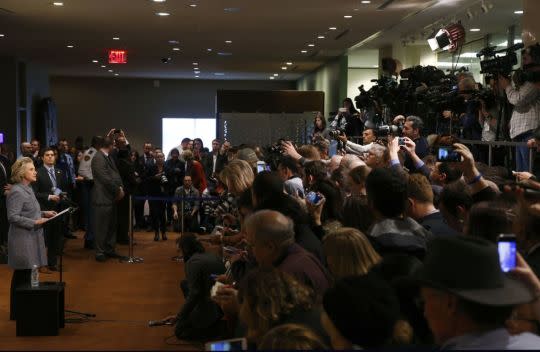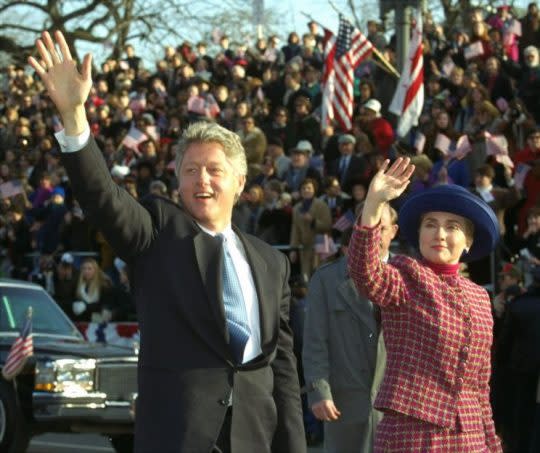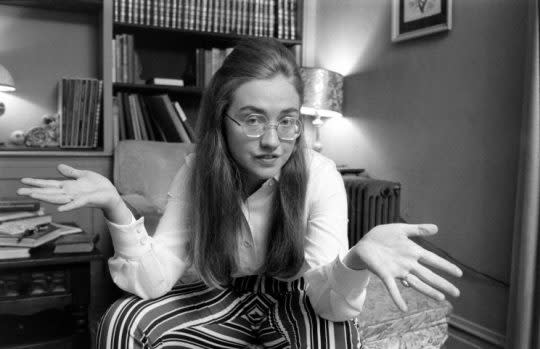In case you missed it, a major party is about to nominate a woman for president
Ninety-six years after women secured the right to vote in American elections and nearly 168 years after the Seneca Falls Convention launched the women’s rights movement in America, a former United States senator from the Empire State has become the presumptive first female major-party presidential nominee in American history.
In short, it’s on.
Hillary Clinton will face off against Donald Trump in the general election in November, the Associated Press announced Monday night.

The first female Democratic presidential nominee will run against a Republican nominee whose brash, often boorish persona has made him strikingly unpopular with women — seven-out-of-10 women in an April Gallup poll held unfavorable views of Trump. Clinton’s shattering of this glass ceiling takes place in an election that has been defined by Trump’s strongman character and displays of crude masculinity. Throughout the GOP primary, male candidates postured amid promises to “carpet bomb” the Middle East, and taunted each other about physical stature and even penis size.
The general election promises a choice so stark it might have been scripted by Gloria Steinem. And yet enthusiasm for the first female nominee has been surprisingly muted, especially compared to the global acclaim that accompanied Barack Obama’s similarly history-changing candidacy eight years ago. The near blanket coverage of Everything Trump has somehow rendered a historic achievement, 227 years in the making, a side note.

All in all, it seemed fitting that a presidential campaign — launched in March 2015 with a chaotic, defensive press conference at the United Nations that was dominated by questions over Clinton’s private email server — came to a strangely anticlimactic conclusion Monday night when she was declared the winner on the basis of a news organization’s poll of superdelegates, rather than with a triumphant, election-night victory announcement.
Even in 2016, it is hard for many Americans to accept women as leaders, whether in the boardroom, on an athletic field or in the Oval Office. Clinton comes with her own baggage and will continue to suffer from self-inflicted wounds. The compromises any woman must make to be viewed as qualified yet unthreatening would have inevitably resulted in a flawed trailblazer. Yet now the country is on the verge of having a woman president — a reality that will take some time to sink in.
* * *
Both before and after his election to the White House, Obama often spoke of standing on the shoulders of civil rights leaders who directly took on institutionalized racism and paved the way for his candidacy. He belongs to what is sometimes called the Joshua generation, the sons and daughters who were able to enjoy a level of success made possible by the struggles of those who came before them. In contrast, Clinton hails from the original modern women’s rights movement, the Moses generation — a reference to the biblical leader who brought the Israelites through the wilderness from Egypt.
Unlike Joshua, Moses never made it to the promised land. And there are very few women from Clinton’s generation who have been in a position to compete for a presidential nomination, much less capture it.
Slideshow:The campaign for primary day, June 7 >>>
Clinton has at once seemed to overcome the constraints of gender and been defined by them. She fought so hard to be seen as tough enough to be commander in chief that those to her left now deride her as just another establishment hawk. She spent decades struggling to adopt the inauthentic personas required of a political wife, alternating awkward attempts to conform to stereotypes she clearly found constraining with sometimes equally awkward efforts to pioneer a new path for women in her rarified position. And having finally captured her party’s nomination, 40 years after entering public life and eight years after she lost a close-fought primary to Obama, Clinton faces the charge — and surprisingly widespread belief — that she only won by “playing the woman card.”

It must seem surreal to the woman who moved to Arkansas with her husband to support his political aspirations, giving up what friends today say could have been a promising political career of her own. But in 1974, the year Clinton arrived in Little Rock, the U.S. Congress was only three percent female. The odds that Clinton would today be in the position she is had she struck out on her own in the political arena in the early 1970s are low. Even Nancy Pelosi, the most powerful female elected official in U.S. history and the first female House Speaker, did not seek office until 1987, when she won a special election as the hand-picked successor to the wife of a congressman who’d taken his House seat when he died.
It is in fact not unusual in American history for pioneering political women to be the wives — or, more commonly, widows — of powerful men. But because this is a path that is only available to women — and at times was their only path to power — the fact of Clinton’s marriage to a former president sits awkwardly in larger American narratives about self-reliance and self-made men. It was only in the year that Clinton moved to Arkansas with Bill that the Senate even passed the Equal Credit Opportunity Act, so that women would no longer face discrimination in opening their own credit card accounts, and Ruth Bader Ginsburg had only a few years earlier successfully litigated the case that extended the Equal Protection Clause of the Constitution to women.
The courts in the early 1970s saw a tumult of activity that would expand opportunities for women, but it would be decades before the doors of political power began to budge. Even 1992, the vaunted “Year of the Woman” that helped lift Bill Clinton to the White House, saw the election of only four new women to the U.S. Senate, bringing the total to six. One of those incumbent senators, Nancy Kassebaum of Kansas, was only the second woman ever elected to a U.S. Senate seat that had not previously been held by her husband.
* * *
As Hillary Clinton herself as acknowledged, she does not possess the charisma and natural political abilities of either her husband or the current president. But she has also faced challenges not under her control that explain the dampened excitement for her nomination.
When Obama became the presumptive Democratic nominee in 2008, even people who did not plan on voting for him in the general election took pride in the signal his achievement sent to the world about how far the U.S. had come. Those who did vote for Obama were vocal about their support, and liked what it said about them. The Obama campaign’s appeal to history was subtle but unmistakable: support hope, support change, support racial progress. While the past eight years have provided ample evidence that the issue of race still roils Americans, the election of the first black president provided a kind of national catharsis — at long last, the end of the civil war.

Clinton’s achievement, on the other hand, represents the work of the greatest nonviolent revolution in history — the transformation of women’s role in society — one that is both unfinished and uncelebrated in many corners of American life. When the Equal Rights Amendment went down in flames more than three decades ago, it did so over an issue that has flared up again this year — protecting womenfolk in public restrooms.
The act of pursuing political office and leading once in power is also fraught for women. The most successful female politicians often don’t start out as charismatic and magnetic presences, but as uber-competent wonks who outwork everyone else. Think Margaret Thatcher or Angela Merkel. Pragmatism and detailed policy proposals don’t inspire enthusiasm like Hope and Change. Nor do women respond to identity politics appeals to support female politicians, a fact that some prominent Clinton supporters learned the hard way this year. Obama could reasonably count on the support of some 90 percent of black voters; no female politician can expect to capture even 70 percent of the women’s vote.
Despite the slow build of enthusiasm for Clinton’s candidacy, however, her historic position still has the potential to galvanize voters as the reality of her accomplishment sets in. She could hardly ask for a better foil than Trump, who shows no intention of treating the symbolism of her candidacy with the professed respect that most Republican leaders showed Obama in 2008 (and that quickly evaporated once he took office). And the culture has changed since 2008, particularly on social media. On Twitter and elsewhere, in the absence of gatekeepers, women have led national conversations about harassment and sexual assault in the military and on college campuses. When a revered male writer says he wasn’t inspired by any female colleagues — the sort of comment men of his generation have been making unchallenged for decades — women mobilize online to correct him. The term “mansplaining” now exists.
After reported debates within her campaign about whether to emphasize her gender, Clinton is emphatically embracing her role. At her election-night celebration on Tuesday, she will be introduced by a new campaign video that underscores the milestone that has just been passed.
And she told ABC News on Monday night that the prospect of becoming the first female major-party nominee made her “very emotional,” reflecting on the cultural impact of her candidacy. “I do think it will make a very big difference for a father or mother to look at their daughter, just like they can look at their son, and say, ‘You can be anything you want to be in this country – including president of the United States.’”

